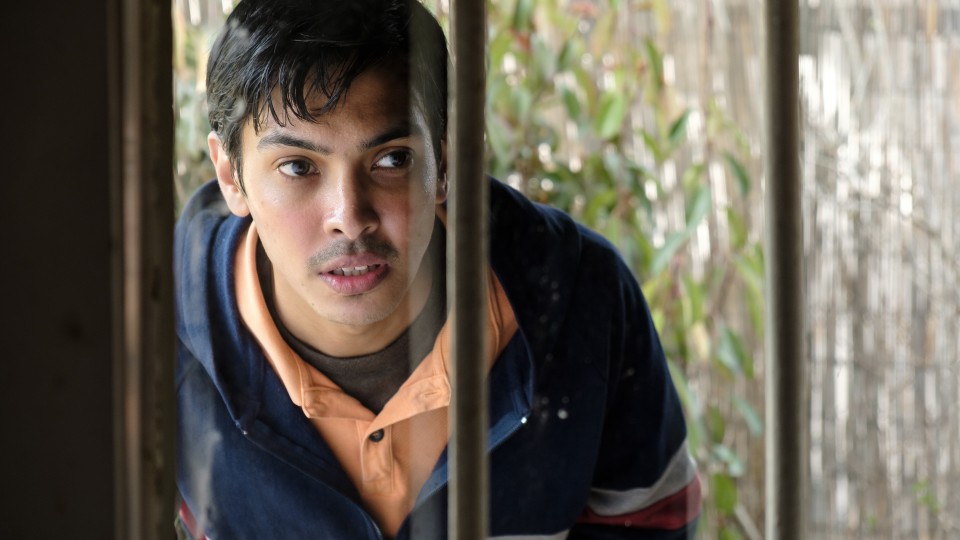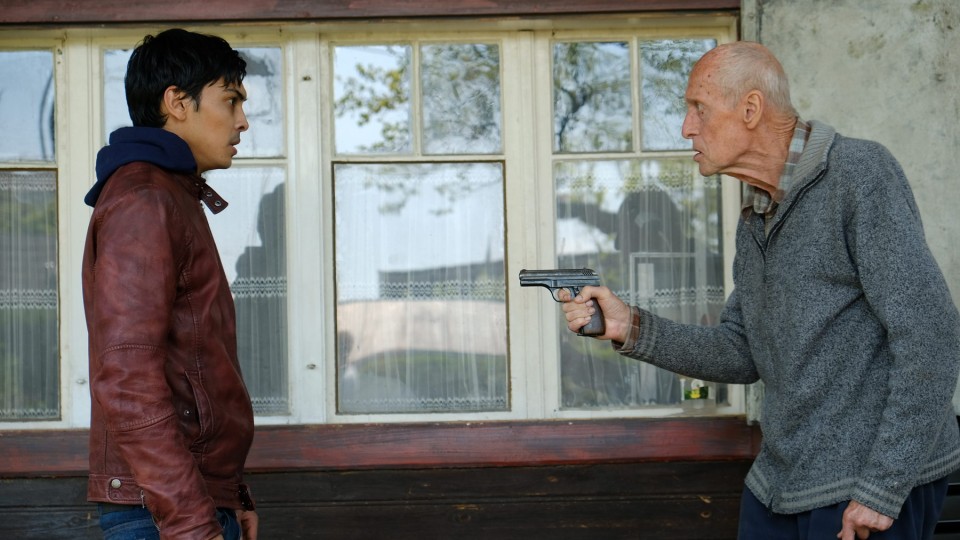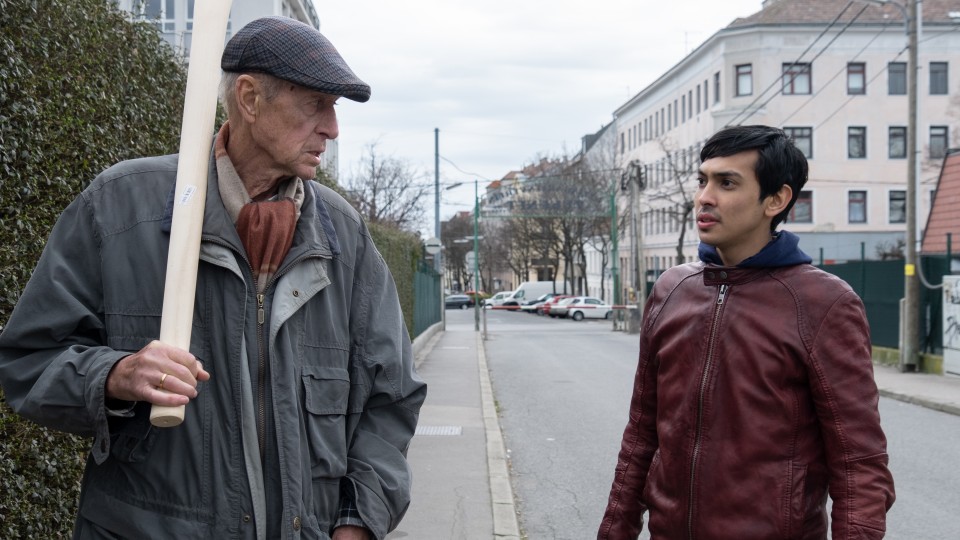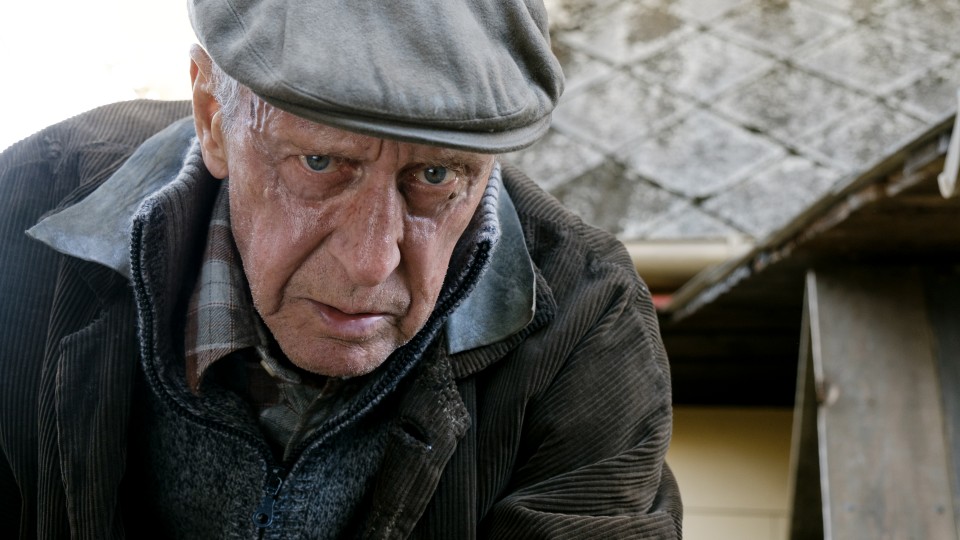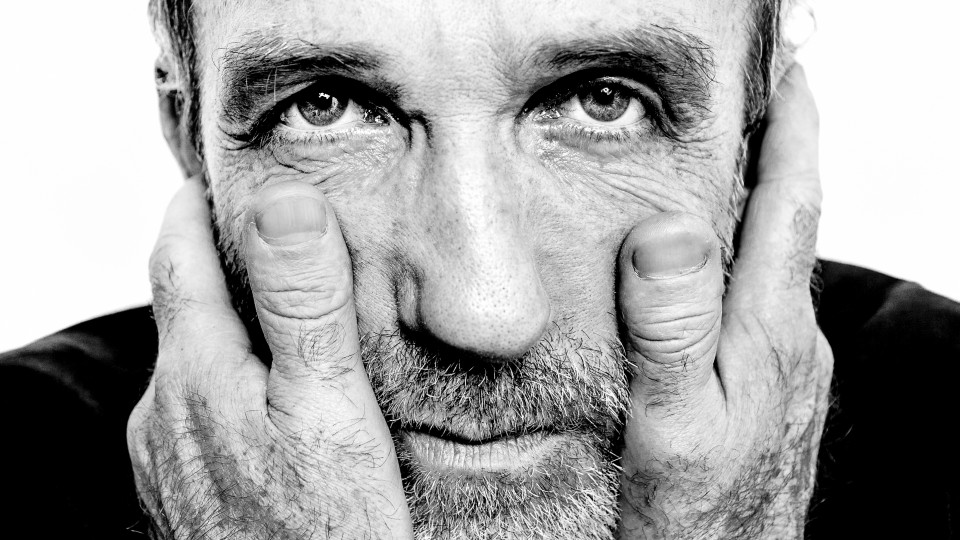The world is a small place for old Herr Senft in his little garden house, and now that he has lost his dog and last companion,
it's a solitary existence as well. Chance brings a young Afghan into his house, and in just a few hours it is transformed
for both men into the cave of the Cyclops, with no escape for either. NOBADI, Karl Markovics's darkest story to date, focusses
on the fragility of identity, the legacy of failure to act and the chances of the present moment.
A dog is dead. The animal was the last remaining companion of its aged owner. The dog's name was Argus, like Odysseus's dog,
and this is not the only reference to Homer's epic in NOBADI (a phonetic rendition of "Nobody"). To what extent did the Odyssey
and its parallels in the present run through the idea behind the screenplay from the very start?
KARL MARKOVICS: In the context of this film, the Odyssey appeared at a relatively late stage. However, it has always been present as a defining
element of my imagination. As you might expect, I first encountered the story at school, and it was one of the few things
that I found really exciting at that time. In relation to NOBADI it only came up gradually. I was reminded of it because
of the "nobody" phenomenon, the interplay between identity and existence, and I became aware how much the absence of one person
can influence another. The interaction between identity and existence has always fascinated me, and that's what prompted this
attempt to approach the subject.
Herr Senft isn't simply alone with his grief; he is also faced with a problem because he must dispose of the dead dog’s
body. There are professionals for things like this, but he's too mean and obstinate. When he attempts to resolve the situation
himself he triggers a fateful sequence of events. Was it one of your initial ideas to set a tragedy in motion from a trivial
incident?
KARL MARKOVICS: It certainly was. Talking about a "catalyst" always makes it sound very conscious and deliberate. When I come up with material
it's at a level below that of the consciousness, but there’s definitely a connection with the trivial or banal. In fact
all my stories feature a banal incident which has major, existential consequence. In Breathing a relatively banal situation in a very simple milieu sets something in motion, and Superworld also focuses on "simple" people with "simple" problems. There is one thing which unites all of us: existence, and the major
questions bound up with it. Some people develop their ideas at an earlier stage, in a profound or educated, intellectual manner.
With others the process takes place later, in a simple way. In the end we all fail to find real answers.
NOBADI is a chamber piece featuring two men who represent two generations, two different life stories and a contemporary confrontation.
How did the two characters, and in particular a complicated figure like Herr Senft, take shape?
KARL MARKOVICS: My characters always seem to emerge of their own accord, and during the writing process they reveal more and more about themselves
as I ask myself questions about them. In this case there were originally two stories that had no connection, and at some point
they merged. In a time of heated debate about the so-called wave of refugees, the idea seemed to fall into place that this
old man and the young man looking for casual work should suddenly share a story. A story about suppressed guilt, about ignoring
your bad conscience and the grotesque consequences that can arise when it's too late for apologies and feeling guilty. Although
my concern is not with some kind of moral judgement: it's more an attempt to explore what could happen if…
You decided to locate the story in an allotment area in the centre of Vienna, a kind of enclave which has sealed itself off
from the urban environment. How important was this labyrinth of fences and locked gates for you? What does this allotment
settlement represent?
KARL MARKOVICS: An environment like that makes it easier to say a lot by means of simple images, at a symbolic level. The atmosphere of being
in some sort of camp, sealed off, the fences and aisles, the entrance area – all this provides visual associations that
don't have to be established with dialogue. On the one hand an allotment area has positive implications to do with fresh air
and nature. But the petty, enclosed atmosphere also gives it a curiously remote feeling, almost hostile to life. Everything
seems forced, even the plants. Nothing is really natural.
The title "Nobadi" refers to a whole range of possible interpretations. It is a reference to the anonymity of refugees who
are only perceived as numbers. It recalls the Odyssey and the cave of the Cyclops, and in Herr Senft's mind it brings back
memories of the way identity was deleted in Nazi concentration camps.
KARL MARKOVICS: I was aware that the "nobody" aspect of the Odyssey story would play a central role here, but strangely enough I only came
up with the actual title Nobadi while I was doing research for another project, when I discovered that Sambadi (sounding like "somebody") is a popular woman's
name in Bangladesh. That set in motion a chain of thoughts which led me to Nobadi and then to tattooing. It's clear that an
expression like this opens up a huge range of connotations. And then I allowed myself to take things further by giving Herr
Senft – who has a tattoo with his blood group, like all members of the SS – the blood group O (zero or nil in German).
For me both characters were always nobodies. One of them is a reference to the period in Austria just after the war when the
entire country consisted of nobodies; suddenly nobody had been a member of the Nazi party, supported Hitler or served in the
SS. In the case of the young man it’s a way of concealing his identity.
The film is carried along by two powerful personalities, and powerful actors are required to depict them. How did you find
the two leading actors, Heinz Trixner and Borhanulddin Hassan Zadeh?
KARL MARKOVICS: I was fortunate in that I worked at a relatively early stage with Hilde Dalik, who started a theatre project with young refugees.
A number of young men worked with her who had some theatrical experience and also residence visas. And that's how I met Borhan,
who – like Thomas Schubert in Breathing – had a "natural instinct for naturalness" in front of the camera. Casting the old man, who despite his age had to be
fit enough to handle 30 days filming, was harder. It took several years to get the project off the ground, because it was
hard to raise the finance. At first I had cast a different actor, but the delay meant he was no longer physically capable
of taking the role. When we finally did raise finance for the film we suddenly found ourselves without one of the leading
actors… two weeks before filming began. Heinz Trixner was an incredible stroke of luck.
After Martin Gschlacht and Michael Bindlechner, this time you had Serafin Spitzer behind the camera; NOBADI was his first
feature film as DOP. What was it like working with him?
KARL MARKOVICS: I met Serafin Spitzer one day when he was shooting the Making Of material for Superworld. He was also a stroke of luck for Nobadi. Originally I had wanted to work with Wolfgang Thaler as cameraman, but raising the finance took so long that by the time
we did, he was tied to a different project. I had already submitted the project three times, so I couldn't postpone it any
longer. And then I remembered Serafin Spitzer, who is incidentally a student of Wolfgang Thaler’s. I believe very strongly
that things sort themselves out. Working together with Serafin was extremely inspiring, very focused. His experience with
documentary films definitely means he brings a documentary approach to feature film camerawork: you can see it in the closeness
to the actors that he establishes, without disturbing them, and in the whole way he works with his equipment and his team.
One interesting aspect of the film is that the confrontation between these two men can represent a confrontation in society
at the moment. When you engineer this collision between a past that has never been processed (in relation to the Nazi regime)
and socio-political attitudes towards people who have come to Europe as refugees in recent years, are you also attempting
to explain contemporary political developments in this country?
KARL MARKOVICS: It's definitely not an attempt to explain anything. An explanation wouldn’t be enough here. The point is to act in the
present, with empathy and humanity, and to demonstrate that if somebody tries to compensate for things 50 or 70 years later
it simply doesn’t work. It is an appeal for a response now to what's happening in front of our eyes, instead of looking
back 10 years from now and wondering whether it might have been better to arrange for refugees to be distributed throughout
EU countries than to simply close the Balkan route. And it was also important to me to point out that in Austria a historical
legacy has a very powerful influence on the social situation today. The world of the past still resonates in the present.
Nothing about it is over; closure hasn't been achieved.
There are scenes in the film which are difficult to watch. Did you struggle with the decision about how far to go? Some of
the images that people want to turn away from feature the young man talking in Dari, so you have to look at the screen simply
to read the translation. And the film finishes with the horrified gaze of the social worker as she looks into the eyes of
Herr Senft. Is NOBADI primarily a film about looking closely and looking away?
KARL MARKOVICS: That's exactly what it's about. In contrast to my first two films, I wrote the screenplay in a very short time. The basic
framework was finished in six weeks. When I read it again, it struck me as very drastic. Writing is one thing, but transposing
the story into images on film and then looking at them is completely different. So I started to weigh up what I should actually
show. When I thought about it for a while I came to the conclusion that I should film it exactly the way it was written. Without
any compromises. Precisely because the story is about looking away, about not actually being able to bear something but at
the same time having to look at it. You can’t live by avoiding horrific things. If you don’t look, it's quite possible
that the next horrific thing will happen because people weren't paying attention, didn't care or couldn't empathize.
Interview: Karin Schiefer
August 2019
Translation: Charles Osborne

